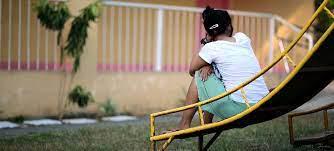
Widespread sexual abuse of children in the entertainment industry must be urgently stamped out, an independent UN expert told the Human Rights Council on Tuesday, presenting hard-hitting findings and recommendations on how to end the scourge.
“The sexual abuse and the exploitation of children within the entertainment industry resulting from unethical systems, structures, practices or abuse of power and authority is widespread,” said Mama Fatima Singhateh, the UN Special Rapporteur on sale and sexual exploitation of children.
Child performers in the entertainment industry are exposed to sexualized, violent and aggressive environments that are unsafe for their integral development and in which they can be exposed to the consumption of addictive substances, she said the report.
To remedy that, urgent action is needed both collectively and by individuals to combat the sexual abuse and exploitation of children in various media and branches of the entertainment industry, the Human Rights Council-appointed Special Rapporteur said.
Beyond #MeToo
“The problem cuts across various facets of the industry and community space, exposing children to risks in the areas of film, television, music, theatre, modelling, circuses, choirs, concerts, nightclubs, bars, glamour industries, sports, tourism and hospitality,” she said in her report.
It also extends to community facilities, at public spectacles and events and in digital space, including social media influencing and gaming, she said, citing lawsuits and the exposure of widespread exploitation in such high-profile cases as film studio boss Harvey Weinstein, who was sentenced 23 years in prison in 2020 for rape, sexual assault and related charges.
Ms. Singhateh stressed that while movements such as Me Too have raised awareness of sexual abuse and exploitation in Hollywood and other entertainment capitals, testimonies from brave victims and survivors have consistently pointed to the urgent need for improved protection for children and young people who go into show business.
Cases go unreported
The global nature of the industry means that such issues are not confined to one geographical region but, rather, are prevalent in countries worldwide, according to the report, which also raises vital questions about the inadequacy of existing prevention and protection measures, accountability systems and access to justice.
“A significant number of abuse cases go unreported, mainly due to the prevailing power dynamics, harmful gender norms, fear of retaliation and loss of career opportunities,” the expert said.
“These factors often create an environment in which individuals in positions of authority exploit vulnerable children, including aspiring actors and performers.”
Grooming is ‘the norm’
The Special Rapporteur found that predatory sexual behaviour, including grooming, was accepted as the norm in the entertainment industry.
Moreover, perpetrators often faced no repercussions for unlawfully exercising power and authority over young and aspiring child performers.
“Abusive work conditions and portrayal of sexual abuse and exploitation of children in various entertainment platforms do not only tend to cross the line, but also objectify and instrumentalise children,” Ms. Singhateh said.
Victims often met with silence
Children are trafficked or recruited to work as performers or entertainers by means of fraudulent offers, misleading promises and the exploitation of their hopes and dreams, she said in the report.
With millions of people around the world fleeing conflict and violence or other situations that are increasingly driving displacement and migration, many children end up without their families and are forced to work in the entertainment industry to survive, according to the report.
“Victims and survivors have been met with silence, non-acknowledgement, lack of investigation, duress, intimidation or non-availability of reparation measures,” she said.
To change the dynamic, the Special Rapporteur called for pathways to mitigate risks.
Such efforts must ensure that the involvement of children and conduct of individuals or businesses within the sector are in line with international human rights law and standards, she said.
Finding solutions
There are “many ways to ensure the health, safety, privacy and well-being of children within the industry”, the Special Rapporteur said.
That includes “rigorously implementing a zero-tolerance policy for those who exploit and foster abusive environments against children within legal frameworks”, she said.
In addition, she suggested establishing partnerships with business owners to ensure child-safe business models and the creation of oversight and accountability procedures.
Internet safety
Efforts should also extend to the internet, she said, noting that children are exploited in the online porn industry, which sometimes involves the physical smuggling of children across borders.
Traffickers often take advantage of interactive computer services, such as social media platforms, to connect with child victims, abusing children’s limited knowledge regarding the safe use of online space, the findings showed.
In this vein, she recommended the setting up of technical safeguards for online spaces and closer collaboration.
Special Rapporteurs and other rights experts are appointed by the UN Human Rights Council, are mandated to monitor and report on specific thematic issues or country situations, are not UN staff and do not receive a salary for their work.
Source: UN News
https://news.un.org/en/story/2024/03/1147247
 FR
FR EN
EN AR
AR








